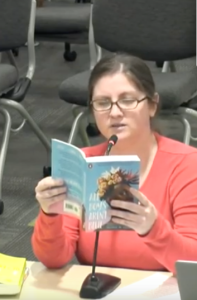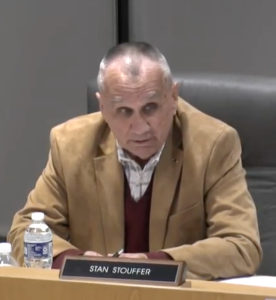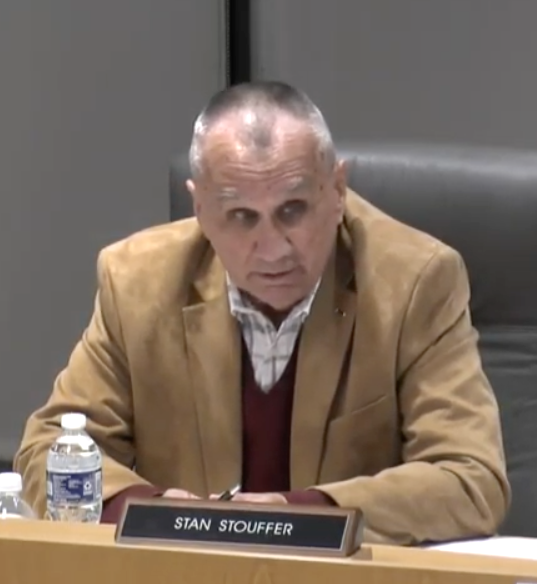by Geoff Fox
A Hancock parent spoke to Washington County Public Schools officials during their November 1 Board of Education meeting regarding three books containing sexually explicit material.
Ashley McCusker asked school officials why they didn’t need to follow the same code of conduct that keeps students from accessing or sharing explicit material, and then read passages from each book that contained graphic descriptions of sex acts and sexual conversations between characters.
McCusker read passages from two books – All Boys Aren’ t Blue which had a graphic description of two males having sex, and Me Earl and the Dying Girl which one character asks another if they’ve performed oral sex on a girl and a third that allegedly gave instructions on how to do different sex acts.
Like all WCPS BOE meetings, this meeting was streamed live on YouTube through the WCPS channel.
In documents handed to school officials before the meeting, McCusker highlighted areas noting that
people are not allowed to use school system networks to access, write, or publish materials that depict profanity, contain sexually suggestive messages or images.
“Why do you get to distribute the type of material that is against the code of conduct?” she asked school board members.
McCusker alleges this wasn’t the first time board members have been made aware of the type of material in these books.
McCusker said it was her feeling there was pornography in the schools.
“Even if we split hairs and decide it’s sexually explicit, it still goes against your code of conduct for us,” she said.
McCusker said she could not fathom how board members could argue how the books should be available for minors.
She did not indicate which school library the books came from.
Not in Hancock school library
County and Hancock school officials confirmed to The Hancock News that the books McCusker read from are not in Hancock’s library collection.
The Hancock News contacted Hancock Middle-Senior High School to see if the books were indeed in the school’s library. The inquiry was passed on to Washington County Public Schools Communications Officer Erin Anderson who replied those books were not in the school’s library. In her email response, Anderson emphasized “not” by underlining the word.
Board split on book control?
 During her presentation, McCusker addressed those who were watching online. She said they were being lied to as parents. However, she would let those people make up their own mind if the books were sexually explicit or pornographic in nature.
During her presentation, McCusker addressed those who were watching online. She said they were being lied to as parents. However, she would let those people make up their own mind if the books were sexually explicit or pornographic in nature.
She claimed the Board of Education is split 4-3 in getting “these types of books” out of high school libraries.
“To the people watching who are appalled, welcome aboard,” McCusker said.
McCusker acknowledged children would be eventually exposed to this type of material, drugs, sex, and alcohol and wondered should they be exposed to them at school.
“At what point do we all agree schools should be a safe zone for children that despite what they might be exposed on the outside, we protect them from it while they’re in school,” she said.
Board members react
The meeting was held a week before the November 8 election in which three seats are up for election – Darrell Evans, Mike Guessford, and Linda Murray.
Guessford, Murray, and Stan Stouffer addressed McCusker’s concern about the books.
When Guessford took his seat for the first time, county schools had just introduced laptops and computers into classrooms, there were issues with students sitting in the back of classrooms looking up inappropriate materials on social media.
Guessford said the schools took steps to be able to censor what could be viewed on WCPS technology with a program that would key in on certain words or terms and prevent the inappropriate material from being viewed in schools.
“I think we did a great job because I don’t ever remember hearing much of it after that,” he said.
What he doesn’t understand is how the same issue arises with books, noting he doesn’t care what people do in their own home or in public, it’s their business.
What he doesn’t want is kids seeing or hearing the type of material in the books presented.
“I am not for that,” Guessford said. “I don’t like it. I wish there was more that we could do or I could do.”
Guessford said there are laws on the books stating nothing can be done, but he didn’t state what those laws are.
Guessford added he wishes there was a way to stop kids from getting those books unless they have parental consent.
“I don’t know if that ever will happen,” he said.
Murray agreed with Guessford about the filter and not liking the book. She admitted she didn’t know how the books got in a school library.
Murray said there is something in place to prevent students from checking out those types of books in county schools.
Her grandson attends school in Washington County and Murray said his mother can go on the library website, find that book, and talk to the library media specialist. The book is scanned and the mother can block her son from checking out that or any other book.
“If he tries to get that book out, it is flagged,” she said. “He cannot have that book. That’s what we have in place right now.”
This means WCPS has a way to not allow students to get books if parents don’t want them to read certain books.
In his 42 years in education, Stouffer said he never knew kids who went to the school library to get a book to read just for the fun of reading it.
The only time he knew of students getting books from the library was to do research projects or for a book report.
He backed Murray’s point of the system in place to prevent students from getting certain books.
“I would expect that books would be in the appropriate grade level,” Stouffer said.
In mentioning the books McCusker read from earlier, Stouffer said he read from one of the three and as well as a couple other books.
He added he has no problem with those books being in a high school library because in four years, they’ll head to college and are exposed to those things or into armed forces where they go into combat or could get killed.
“If we’re talking about these books being in an elementary library, that’s one thing. Middle school, that’s another thing,” Stouffer said.
Stouffer also brought up the book Crank by Ellen Hopkins.
Crank was published in 2004 and based loosely on the real-life addictions of Hopkins’ daughter to crystal meth. The book has been suggested as required reading for high school students. It has also been banned in many locations due to depictions of drug use, adult language, and sexual themes.
In reading the book, Stouffer said he thinks it is an appropriate book for high school students to read because of the drug issues in the county and Washington Goes Purple program.
“That’s a book I would recommend parents read with their child and discuss the book,” he said.
In an online search of the school’s library (https://libguides.wcps.k12.md.us/HancockMHS/home), Crank is available at Hancock Middle-Senior High School.
No other board members, nor did Superintendent David Sovine, commented on the situation.
According to the WCPS website, library media center resources are selected “not only to support instruction and achievement in all content areas but also to foster curiosity and creativity by appealing to students’ informational and pleasure reading interests.”
For information regarding how WCPS selects their books, visit https://wcpsmd.com/library-media-services and click “The WCPS libguide can be found here” at the top of the page.


